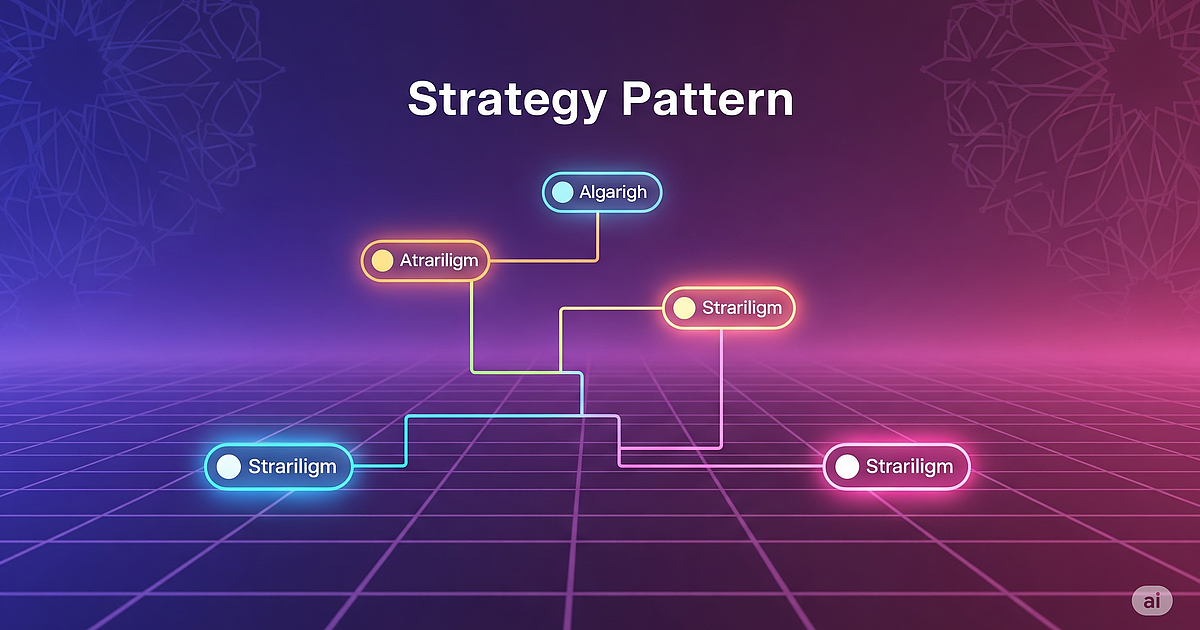What is the Strategy Pattern and Why Is It So Important in Code Review?

In modern software development, code readability and maintainability are among the most critical factors for project success. The Strategy Pattern, as one of the GoF (Gang of Four) design patterns, is a powerful tool that facilitates switching between algorithms and solves the common problem of if-else chains frequently encountered during code review processes.
Today's AI Code Review tools are quite successful at detecting the Strategy Pattern. Using the Strategy Pattern in your code allows you to achieve higher quality scores in automated code review systems.
The Basic Structure of the Strategy Pattern
The Strategy Pattern is a behavioral design pattern that enables algorithm selection at runtime. This pattern is particularly recommended when:
- You need to choose between multiple algorithms.
- If-else or switch-case blocks become complex.
- "Open/Closed Principle" violations are detected in code review.
Implementing the Strategy Pattern
Traditional Approach (A Red Flag in Code Review)
class PaymentProcessor
def process_payment(amount, method)
case method
when 'credit_card'
# Credit card transaction
puts "Processing #{amount} TL with credit card..."
validate_credit_card
charge_credit_card(amount)
when 'paypal'
# PayPal transaction
puts "Processing #{amount} TL with PayPal..."
validate_paypal_account
charge_paypal(amount)
when 'bank_transfer'
# Bank transfer
puts "Processing #{amount} TL with bank transfer..."
validate_bank_account
process_bank_transfer(amount)
else
raise "Unsupported payment method: #{method}"
end
end
end
Refactored with Strategy Pattern (Code Review Approved)
# Strategy Interface
class PaymentStrategy
def process(amount)
raise NotImplementedError, "Subclasses must implement the process method"
end
end
# Concrete Strategies
class CreditCardStrategy < PaymentStrategy
def initialize(card_number, cvv)
@card_number = card_number
@cvv = cvv
end
def process(amount)
puts "Processing #{amount} TL with credit card..."
validate_card
charge_card(amount)
end
private
def validate_card
# Card validation logic
puts "Validating card information..."
end
def charge_card(amount)
# Card charging logic
puts "Charged #{amount} TL from the card"
end
end
class PayPalStrategy < PaymentStrategy
def initialize(email)
@email = email
end
def process(amount)
puts "Processing #{amount} TL with PayPal..."
validate_paypal_account
charge_paypal(amount)
end
private
def validate_paypal_account
puts "Validating PayPal account: #{@email}"
end
def charge_paypal(amount)
puts "Charged #{amount} TL from PayPal"
end
end
class BankTransferStrategy < PaymentStrategy
def initialize(iban)
@iban = iban
end
def process(amount)
puts "Processing #{amount} TL with bank transfer..."
validate_iban
process_transfer(amount)
end
private
def validate_iban
puts "Validating IBAN: #{@iban}"
end
def process_transfer(amount)
puts "Sent #{amount} TL via bank transfer"
end
end
# Context Class
class PaymentProcessor
def initialize(strategy)
@strategy = strategy
end
def change_strategy(strategy)
@strategy = strategy
end
def process_payment(amount)
@strategy.process(amount)
end
end
Usage Example
# Using different payment strategies
credit_card = CreditCardStrategy.new("1234-5678-9012-3456", "123")
paypal = PayPalStrategy.new("[email protected]")
bank_transfer = BankTransferStrategy.new("TR33 0006 1005 1978 6457 8413 26")
processor = PaymentProcessor.new(credit_card)
processor.process_payment(100.0)
# Changing the strategy
processor.change_strategy(paypal)
processor.process_payment(250.0)
processor.change_strategy(bank_transfer)
processor.process_payment(500.0)
Advantages of the Strategy Pattern in Code Review
1. Single Responsibility Principle (SRP)
Each strategy class is responsible for only one payment method. This is immediately noticeable in a code review.
2. Open/Closed Principle (OCP)
You don't need to modify existing code to add new payment methods.
class CryptoStrategy < PaymentStrategy
def initialize(wallet_address)
@wallet_address = wallet_address
end
def process(amount)
puts "Processing #{amount} TL with cryptocurrency..."
validate_wallet
transfer_crypto(amount)
end
# ... other methods
end
3. Testability
Each strategy can be tested separately, which increases your unit test coverage.
require 'rspec'
RSpec.describe CreditCardStrategy do
let(:strategy) { CreditCardStrategy.new("1234-5678-9012-3456", "123") }
describe '#process' do
it 'processes credit card payment successfully' do
expect { strategy.process(100.0) }.to output(/Processing 100.0 TL with credit card/).to_stdout
end
end
end
AI Code Review Tools and the Strategy Pattern
Modern AI code review tools like Erbab.dev evaluate the use of the Strategy Pattern positively because:
- Cyclomatic Complexity decreases
- Code Duplication is reduced
- Maintainability Index increases
- Technical Debt is lowered
Performance Considerations
Performance points to consider when using the Strategy Pattern:
class OptimizedPaymentProcessor
def initialize
@strategies = {
'credit_card' => -> { CreditCardStrategy.new },
'paypal' => -> { PayPalStrategy.new },
'bank_transfer' => -> { BankTransferStrategy.new }
}
end
def process_payment(amount, method, **options)
strategy_factory = @strategies[method]
raise "Unsupported payment method: #{method}" unless strategy_factory
strategy = strategy_factory.call
strategy.process(amount)
end
end
Real-World Scenarios
Consider using the Strategy Pattern in these situations:
- E-commerce Platforms: Different payment gateways
- Logger Systems: Different log formats (JSON, XML, Plain Text)
- Data Export: Different file formats (CSV, Excel, PDF)
- Sorting Algorithms: QuickSort, MergeSort, BubbleSort
- Authentication: OAuth, LDAP, Database
Conclusion
The Strategy Pattern is the most elegant solution for the complex if-else structures frequently encountered in code review processes.
The fact that AI code review tools also favor this pattern shows how important it is in modern software development. This approach, which aligns with clean code and SOLID principles, will also accelerate your team's internal code review processes.
As erbab.dev, we continue to produce in-depth content on modern software development practices and design patterns. To improve your code review processes, write clean code, and increase team productivity, you can follow us at erbab.dev and get information about current technology trends. You can take advantage of a discount with the %50 Discount link. Don't forget to check out our comprehensive content on the platform for more practical examples and real-world scenarios related to the Strategy Pattern and other design patterns!
Alperen Bozkurt
alperenbozkurt